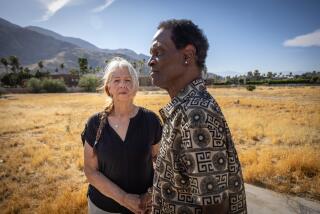‘I’m like Sam Bowie at the Alamo. I never run away.’ --Sam Porter : Sam Porter Gives In but Refuses to Give Up
- Share via
The 10-year-old pipe dream that was Porterville is gone, dismantled by controversial retired rancher Sam Porter in a long-running dispute over illegal water hookups and creeping development.
Porterville, an enclave of low-income families that rented the ramshackle collection of abandoned boxcars, shacks and trailers on Porter’s Trabuco Canyon property, had become “economically unfeasible,” said Porter, 61, who claimed he was “harassed to death” by county fire and health agencies, which finally ordered the settlement closed.
So Sam Porter gave in, and for the past few months he has been evicting the nearly 35 people who lived on his property. He said he has decided to put his 280-acre Trabuco Highlands ranch up for sale.
Last week, after taking a passenger on a numbing drive along a torturously rocky road to his hilltop home, he talked about the long-running controversy with the Santa Ana Mountains Water District, about his latest dispute with a developer building upscale homes near his ranch, and in the grandiose and sometimes contradictory fashion that is typical of the man, he talked of even rebuilding Porterville on his ranch if he can’t sell it--as a way to thumb his nose at the Establishment and help solve the housing crisis in one swoop.
“People have described me as cantankerous and difficult,” he said. “But I’m like Sam Bowie at the Alamo. I never run away.”
The Porters--wife Jeanne, 38, is an English teacher at nearby Joplin Boys Ranch--said their namesake community began innocently enough when a man who had been living in nearby O’Neill Park appeared on their doorstep, hat in hand, and asked if he could stay. Soon, word spread to other homeless in the area, and the working poor, many with children, flocked to the ranch.
Porter bought an old boxcar, a school bus and several trailers for them to live in and charged rents, which he says averaged $50 to $60 but went as high as $150.
Many families also built simple but well-made wood cabins on the property, with patios, lofts and porches, and usually under tall coastal oaks.
The Porters said that probably a dozen children were born on the ranch over the years. They joked that they always meant to take a look at one of the birth certificates to see if it named the birthplace as Porterville.
Walking through the ranch, Porter pointed out the remains of an identifiable community--still-neat vegetable gardens, old dryers, refrigerators, plumbing fixtures, brooms, rugs and toys--all hurriedly abandoned amid the wildflowers, sage and cactus.
“It’s very depressing to be down here with everybody gone,” Porter said.
While some accuse Porter of exploiting homeless migrant workers to make money, he insists that he never took advantage of his tenants.
Wayne Chastain, a 3-year Porterville resident who has not yet been evicted because he works on the ranch, said Porter, whom the residents referred to as El Patron, treated everyone fairly.
“There was exploitation, but Sam was the one being exploited,” Chastain said. “We paid rent, but it didn’t near compensate for what it cost Sam and Jeanne to run this place. I’ve never been treated better by anyone in my life.”
Chastain, who still sounds faintly of his native Kentucky, said he stays in his neat-but-crude cabin because he loves the land.
“Progress has caught up with us, though,” he said. “They took away the canyon and the eucalyptus trees, and now you have to look at $300,000 houses.”
Other former residents of Porterville seemed to agree that Porter was a fair landlord, if not quite the humanitarian that some portray.
“It was strictly business,” said Steve McCutchen, 29, who says he lived in a trailer on the ranch for several months last year, until evicted. “He came around to collect the rents, I paid $100 a month. Sam’s attitude was, you pay the money, you can stay.”
McCutchen said he came to Orange County from his home state of Oregon looking for work--”I looked at a map of business growth and this seemed to be the place”--but could not find a steady job.
He camped out in O’Neill Park and heard of Porter’s ranch from friends he made at the general store across from the park.
Many former residents were angry about being evicted because they had no place else to go, he said. But McCutchen said he can also sympathize with Porter.
“I think maybe his motive in the beginning was that Porterville would be sort of a way station for people having a hard time. But people got here and saw how easy it was to hang out and they stopped working,” he said.
At the general store where other former Portervillians often gather, there was agreement that where once Porterville was a home for the working poor, many found it easier to drop out of jobs to try to eke out an existence in the canyon.
“Some of them were given 4 hours to get their things and get off the ranch,” said one former resident who asked that his name not be used. “But what did they expect? They fooled around. . . . They didn’t work and didn’t pay rent. How would you like somebody like that living around you?”
McCutchen said people in Porterville generally got along with each other but not always with Sam.
“I worked for him on the ranch and knew him for a long time, but he was not the sort to stop by and chat. I still can’t figure him out,” McCutchen said.
Mention the name of Sam Porter and such adjectives as colorful, opinionated, boisterous and abrasive spring forth with little prodding--and are often accompanied with a chuckle or a moan.
He was born in Ogden, Utah, and came to California in 1946 to attend USC. He ended up in El Toro as a cement contractor--20,000 patios poured in Mission Viejo alone, he claims--but found that his cement mixers and other heavy equipment were not very welcome in the neighborhood.
He thinks it ironic that he moved to his Trabuco Canyon retreat 10 years ago to get away from the trouble in El Toro.
Critical of local government and its handling of development in the county, he ran an unsuccessful campaign for a seat on the Board of Supervisors last year against incumbent Gaddi H. Vasquez.
Porter was elected to the Santa Ana Mountains Water District Board in 1985 and refers to himself as a maverick out to shake things up.
“You have to stand your ground sometimes. I guess I’ve just gotten accustomed to standing my ground all the time,” Porter said excitedly while pacing the dining room of his self-built home recently.
He proved it by quickly getting into trouble with his own water board when the district filed suit against him after it found that he had illegally connected several of the structures in Porterville to a single water meter. It came to be known as the Trabuco Water Wars by the locals.
Critics of Porter see his antics as intimidation--a way to get what he wants.
“I’ve seen him in action for years screaming and hollering at board meetings,” said Charles Wall, a water district colleague. “He is a bit different. I think he liked to shout at people just to see if he could get his way. But he’s calmed down recently.”
Wall scoffed at Porter’s contention that he established Porterville because it was his charitable Christian duty.
The board “tried to offer him a structured settlement if he was really trying to help the homeless,” Wall said of efforts to end the water dispute. “But that was not his intention. His intentions were to get people to stay on his land to make money. That’s why it started and that’s why it ended.”
When told of Wall’s comments, Sam and Jeanne Porter laughed.
“We paid for propane for the hot water, we cleaned up after (the tenants), we translated documents, opened bank accounts, helped prepare income tax returns,” said Jeanne Porter. “It was like a 24-hour job for us.”
When the 35 or so migrant workers were ordered by the county to move and began leaving Porterville 6 months ago, the disputes and legal tangles generated over them seemed about to fade from sight.
A lawsuit filed by the water district against Porter over the illegal hookups is likely to be dropped at the district meeting this month, following a recent inspection of the property.
The district board of directors, of which Porter is still a member, now functions without prolonged shouting matches as was once the case, and is anxious to put the Porterville “embarrassment” behind it, directors say.
But for a man who summons images of Stonewall Jackson and Leonidas at the battle of Thermopylae to illustrate his resolve, things are never easy, and the emotion aroused over the shantytown of homemade shelters will not abate.
He remains bitter about some former residents who he claims stopped paying rents when his dispute with the water district surfaced. And he claims that the efforts to shut down the community are a personal vendetta against him by unnamed enemies.
And where once the hills above his home echoed only with the wafting breezes, most echoes now are of hammers and bulldozers.
It is the bulldozing and grading under way on a nearby ridge overlooking his cabin-like home that has spurred the latest twist.
Porter claims that he made an agreement with the developer--the William Lyon Co.--to build a road to his property if Porter would dismantle the unsightly collection of buildings on his property.
Porter now alleges that the developer--with an eye toward purchasing Porter’s spread at a rock-bottom price--is trying to renege on the deal by offering to build an unacceptable road and thus make it difficult for him to sell the ranch by restricting access.
Attempts by The Times to reach the Lyon Co. spokesman familiar with the case were unsuccessful. Other Lyon officials declined comment.
As a result, Porter is not only threatening legal action but says that if he can’t sell his ranch, he will build a new Porterville on it--under the noses of the future well-to-do canyon homeowners. He said he has put a deposit on 200 Quonset huts to prove it.
“Porterville will rise again, and we will do a first-class job of it this time,” he said. “It will have plumbing, heating, and all the homes will have (water) meters so there will be no problem there. We’ll build it sans county approval if I get no satisfaction.”
Bill Grant, enforcement manager for the county Environmental Management Agency, which found that the homes in Porterville I did not meet building codes, said he doubted that Porterville II would fly.
“I don’t think a village of Quonset huts would meet building codes,” he said, laughing. “No, not even if there was electricity and plumbing. But it sounds like Sam Porter.”
Still, some homeless advocates commend Porter’s efforts and say the lack of affordable housing will have to be tackled on an individual basis.
“Private efforts like Porter’s will become more and more important if there are fewer resources to deal with the problem,” said Scott Mather, director of the county Homeless Issues Task Force.
“Unfortunately, this is what can happen when you try to do something like that. You have to make sure you don’t get caught up in city and county code requirements. One of the things we have done is to request that the county exempt certain fees and codes so we can make inroads into this problem.”
But for Porter there are no second thoughts about starting all over again.
“There need to be more provisions for working people in this county,” he began, his voice building to a crescendo as he mapped out the new Porterville in his mind. “We’ll divide the huts in half and have 400 families. I’ll charge $200 to $250 a month for rent. . . .”
More to Read
Sign up for Essential California
The most important California stories and recommendations in your inbox every morning.
You may occasionally receive promotional content from the Los Angeles Times.














